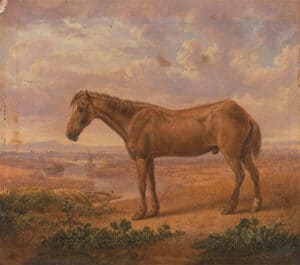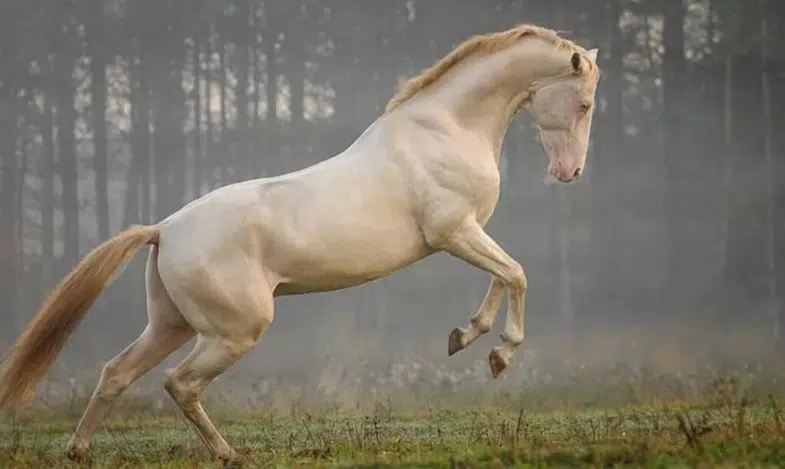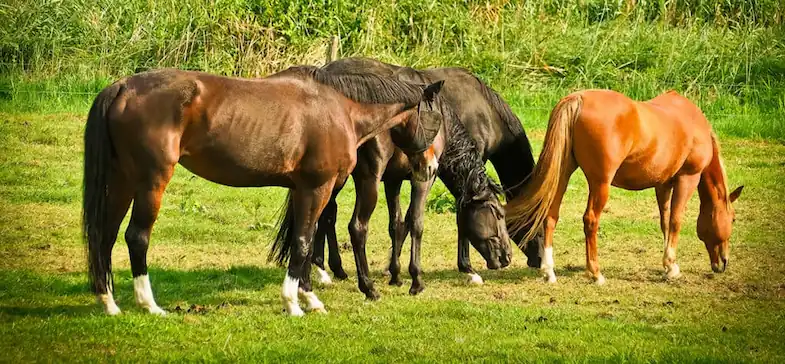When you’re buying a new pet (and let’s be honest many of us buy horses as pets or companions) you need to consider how old they are and what their life expectancy might be. While we all know roughly how long a horse could live for I thought I’d do some research into this and what that means when you transfer it into human years, you may be surprised by the results.
How long do horses live for? An average horse will live to be 27 years of age, although the typical age range for horses is between 25 and 30 years, that said though it’s not uncommon for horses to live into their 40s and even 50s. The oldest ever horse lived to a staggering 62 years of age!
To say that a horse’s lifespan is between 25 and 30 years doesn’t really answer the question though and there too many variables that can play a role in this. How often and how hard a horse is worked, what their diet is like as well as their genetics will all have an effect on an individual horse’s lifespan.
How old is a horse in human years?
Have you ever wondered how old your horse is in human years? I know I certainly have but there are no hard and fast rules that say 1 horse year is equivalent to X human years. Instead, the human age of a horse depends on how old the horse is. For the first two years of a horse’s life, 1 year is equal to 6.5 human years, at 3 that changes to 5 human years, but after that, a horse age is reduced to just 2.5 human years.
If you want to know your horse’s human age the table below will help you to find that:
| Horse Age | Human Age |
| 1 | 6.5 |
| 2 | 13 |
| 3 | 18 |
| 4 | 20.5 |
| 5 | 23 |
| 6 | 25.5 |
| 7 | 28 |
| 8 | 30.5 |
| 9 | 33 |
| 10 | 35.5 |
| 11 | 38 |
| 12 | 40.5 |
| 13 | 43 |
| 14 | 45.5 |
| 15 | 48 |
| 16 | 50.5 |
| 17 | 53 |
| 18 | 55.5 |
| Horse Age | Human Age |
| 19 | 58 |
| 20 | 60.5 |
| 21 | 63 |
| 22 | 65.5 |
| 23 | 68 |
| 24 | 70.5 |
| 25 | 73 |
| 26 | 75.5 |
| 27 | 78 |
| 28 | 80.5 |
| 29 | 83 |
| 30 | 85.5 |
| 31 | 88 |
| 32 | 90.5 |
| 33 | 93 |
| 34 | 95.5 |
| 35 | 98 |
| 36 | 100.5 |
How do you tell a horse’s age?
We’ve all heard the expression describing something (or somebody) that’s getting on a bit as ‘long in the tooth’, but did you know that the saying comes from the way we tell a horse’s age? Yes, that’s right, the most reliable way of telling a horse’s age (short of knowing exactly when they were born) is by looking at their teeth.
How can this be the case? Just like us, most horses are born without any teeth, but by the time they’re just a few weeks old, their first teeth start to erupt. This is then followed by further deciduous (or milk) teeth as the horse grows until they reach approximately 4 when the last of their deciduous are replaced by permanent teeth.
Throughout a horse’s life, the number of teeth a horse has (as well as how much of the tooth is shown, and its angle) will follow a set pattern, with certain teeth erupting at certain points of a horse’s life.
What are the stages of a horse’s life?
Just like any animal, horses go through different stages in their life but it can be difficult to know what those are, especially if you’re new to the world of horses. I thought that rather than write about the different stages it would be easier to put them all into a table:
| Stage of Life | Horse’s Age |
| Foal (also known as a weanling) | < 1 year |
| Yearling | 2 years |
| Filly / Colt (also known as an adolescent) | 4 years |
| Mature | 5 years |
| Middle Aged | 13 years |
| Senior | 20 years |
| Extremely Old | 30 years |
How lifestyle can affect your horse’s life
Every horse is different and there are no fixed rules that say if you do this your horse will live for x number of years but that said there are certain things that you can do that will help your horse to live a fuller and happier (and hopefully longer) life.
Food: Overfeeding your horse will invariably leave to excess weight that will increase the strain on his body. We all want to spoil our horses but overfeeding them isn’t the way to do it. Instead feed your horse appropriately taking his age, weight, and workload into account. If you do want to feed your horse treats though then you can’t go far wrong with Little Horse Bakeries Flax treats (available on Amazon), they’re made from natural ingredients and even suitable for horses with Cushing’s.
Exercise: There’s a balance between over-exercising your horse and allowing him to become lazy. Be honest with yourself about your horse’s limitations and don’t push him behind his capabilities. Unless your horse is on strict stall rest or under veterinarian orders to rest he should have some sort of exercise every day (even if it’s just regular turn out).
Stress: Just like us, horses can suffer from stress but there are things you can do to help reduce this. If possible allow your horse to graze with other horses. This will help to reduce his stress and also give him time to exercise his natural instincts to graze and bond with his herd mates.
Do some breeds live longer than others?
You might think that all horses (and ponies for that matter) live to around the same age but this isn’t always the case. A recent study carried out by the Ontario Ministry of Agriculture found that while the average lifespan of a domestic horse is 25 to 30 years ponies are more likely to live into their 40s (continuing to work well into their 30s). The study also found that smaller breeds (like the Arabian or Welsh) are far more likely to outlive larger breeds (such as Irish Draughts and Dutch Warmbloods), with draft breeds faring slightly worse.
The reason for this isn’t known for sure but it’s believed that smaller breeds don’t travel as fast as their larger counterparts so their hearts aren’t working so hard.
How old is the oldest horse?

As I say the average horse will live to around 30 years but there have been many horses over the years that have lived far longer. Horses such as ‘Badger’, an Arabian x Welsh showjumper from Cardigan in Pembrokeshire, UK who was foaled in 1953. The grey gelding who was originally known as ‘Little Boy Blue’ died in 2004 at the grand old age of 51 years.
While that might sound impressive he was just a youngster compared to the appropriately named ‘Old Billy’ (pictured left), a chestnut draft horse that was foaled in 1790. Bred by Edward Robinson in Lancashire, UK, Old Billy was a barge horse who spent most of his life pulling barges up and down the canals and lived to a staggering 62 years of age!
There are two things to consider when using the same bit for multiple horses, the fit of the bit and any health issues the horse has. When it comes to the fit, it’s crucial that it’s right for both horses and doesn’t pinch at all. That said though if one of the horses has a contagious health issue they will pass it on to other horses using the same mouthpiece. With this in mind, you can use the same bit but it’s not advisable.
How long do ponies live?
On average ponies have a slightly longer life expectancy than that of horses. Ponies often live well into their 30s with many reaching the grand old age of 40. There are many theories as to why this is the case but one such theory is that they’re more chilled out and laid back!
How long do miniature horses live for?
Despite being horses rather than ponies, these diminutive little equines live for slightly longer than their full-size counterparts, with an average lifespan somewhere between 25 and 35 years, although it’s not known why this is the case.
How long do racehorses live?
Many racing fans talk about a racehorse’s career (which typically lasts 2 to 3 years) as being their ‘working life’ but like all horses, they have a natural life expectancy of between 25 and 30 years. I say natural life because sadly some horses end their life on the track.
I hope you found this article helpful. If you did I’d be grateful if you could share it please as it would really help me.
Recommended products
Over the years I have tried hundreds of different horsey products, from various blankets and halters to different treats. Some I’ve loved, others I’ve hated but I thought I’d share with you my top all-time favorite products, the ones I never leave the yard without. I’ve included links to the products (which are in no particular order) that I really think are great.
- Horse Knots by Reference Ready – If you’re like me and enjoy pocket reference guides then you’ll love this knot tying guide. These handy cards can easily fit in your pocket or attach to the saddle for quick reference. They’re waterproof, durable and are color coded to make them easy to follow.
- Mane ’n Tail Detangler – Even if you never show your horse you’ll need to detangle his tail from time to time (and possibly his mane too) which is always a challenging chore! I’ve found that if I run a little bit of detangler through my horse’s tails every few days it stops them from getting matted up and makes combing them easy, even if they’re coated in mud. I don’t know if I should admit to this or not but it also works wonders on my hair.
- TAKEKIT Pro clippers – Over the years I’ve tried a lot of different clippers and while some were obviously better than others I found these to be by far the best. They are heavier than a lot of other clippers but for me, that’s a good thing, it makes them feel more sturdy and hardwearing. On top of that they have a range of speeds so are just as good for clipping your horse’s back as they are his face. I also like the fact that they come in a handy carry case but that’s not for everybody. The company that makes them is super good and incredibly helpful too, a real bonus these days. The only thing I wasn’t keen on was the fact that it doesn’t come with any oil, but that’s not a major problem as it’s not difficult to buy lubricant.
- Shire’s ball feeder – There are so many boredom buster toys out there but I like to use these every day, regardless of whether or not my horses are bored. I find that it helps to encourage my horses to problem solve by rewarding them with treats (or pieces of fruit) but it also mimics their natural grazing behavior which helps to keep them calm and de-stressed.
- Horse safe mirror – This is a strange one that many people are surprised about but I like to put horse safe mirrors in the trailers as well as in the quarantine stalls. It helps to prevent the feeling of isolation by giving the impression of other horses being around. Being herd animals horses can get extremely stressed when they feel that they’re on their own but with these stick-on mirrors, they believe that at least one other horse is with them.
- Rectal thermometer – I know this isn’t glamourous at all but it’s vital for your horse’s well-being to be able to check their temperature and a rectal thermometer is the easiest way of doing this which is why I’ve added it to the list.
Shopping lists
I’ve also put together a few shopping lists of essential items that I’ve found helpful over the years. I’ve broken the lists down into different categories rather than put everything in one massive list 😉



